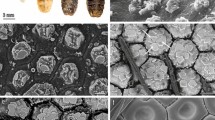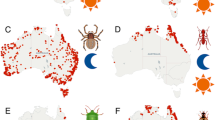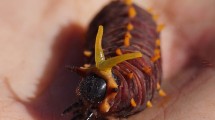Abstract
RESILIN is an elastic structural protein which was discovered by Weis-Fogh in the wing-hinges of locusts1. The substance can be identified with certainty only by the use of several tests, by means of which it has been demonstrated in specific areas of cuticle in insects and crustacea2.
This is a preview of subscription content, access via your institution
Access options
Subscribe to this journal
Receive 51 print issues and online access
$199.00 per year
only $3.90 per issue
Buy this article
- Purchase on Springer Link
- Instant access to full article PDF
Prices may be subject to local taxes which are calculated during checkout
Similar content being viewed by others
References
Weis-Fogh, T., J. Exp. Biol., 37, 889 (1960).
Andersøn, S. O., and Weis-Fogh, T., Adv. Insect Physiol., 2, 1 (1964).
Jobling, B., Pamsitology, 24, 449 (1933).
Rice, M. J., J. Insect Physiol. (in the press).
Rice, M. J., J. Insect Physiol., 16, 277 (1970).
Bennett-Clark, H. C., J. Exp. Biol., 40, 223 (1963).
Author information
Authors and Affiliations
Rights and permissions
About this article
Cite this article
RICE, M. Function of Resilin in Tsetse Fly Feeding Mechanism. Nature 228, 1337–1338 (1970). https://doi.org/10.1038/2281337a0
Received:
Issue Date:
DOI: https://doi.org/10.1038/2281337a0
This article is cited by
-
Resilin matrix distribution, variability and function in Drosophila
BMC Biology (2020)
Comments
By submitting a comment you agree to abide by our Terms and Community Guidelines. If you find something abusive or that does not comply with our terms or guidelines please flag it as inappropriate.



